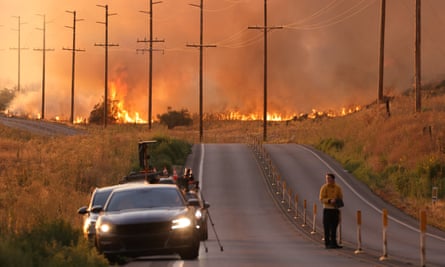The world has just gone through a remarkable experience. It endured the hottest week ever recorded between 3-10 July this year. And meteorologists say there is more to come – a lot more.
Soaring levels of carbon dioxide in the atmosphere and an unusual band of strong winds that have hovered high over the Atlantic have already triggered heatwaves in Texas, Greece, Spain, Italy, and a host of other nations.
Red weather alerts have been issued across Europe; wildfires are raging in Croatia, on the Adriatic coast, and in Navarra in Spain; while tourist targets such as the Acropolis have been closed as temperatures have soared into the forties.
The Earth has not experienced anything like it since instrumental measures of air temperatures began in the 1850s, the World Meteorological Organisation revealed last week. “We are in uncharted territory and that is worrying news for the planet,” said Prof Christopher Hewitt, the WMO’s director of climate services.
This point was backed by Karsten Haustein, a research fellow in atmospheric radiation at Leipzig University. “The chances are that the month of July will be the hottest month ever … ‘ever’ meaning since the Eemian [interglacial period], which is some 120,000 years ago.”
On top of the triggers of the current record-breaking heatwaves, a growing El Niño event in the Pacific is beginning to make its presence felt across the globe.
El Niño is a periodic climatic event that occurs when the circulation of the equatorial Pacific Ocean shifts and its temperature rises, causing knock-on heat impacts around the world.
“A typical El Niño temporarily adds about 0.2C to average global temperature,” said Jeff Knight, manager of climate variability modelling, for the Met Office.

“This increase is dwarfed by the 1.2C that we have seen from climate change since the Industrial Revolution but added to that human-induced warming, a new global temperature record is still likely to be set before the end of next year.”
As a result, many scientists warn that this year or next could see world temperatures pass the 1.5C threshold that was set by the IPCC as being the upper limit for a rise in global warming that would avoid the planet passing through meteorological tipping points that could bring irreversible changes to world weather patterns.
The consequences of a new record heatwave occurring very soon will be profound and dangerous, add scientists. More than 61,000 people are now estimated to have died as a result of the soaring temperatures that gripped Europe last summer.
Given the likelihood of that record being broken this year – or next year at the latest – there is a strong chance that 2022’s grim death toll will be topped very soon with Mediterranean nations such as Greece, Spain and Italy likely to suffer the worst consequences.
According to UN secretary general António Guterres “climate change is out of control”. He warned that if the world persisted in delaying key measures needed to limit fossil fuel emissions, it would move “into a catastrophic situation”.
Many scientists have reacted to this alarm with rueful resignation. They have warned for more than 30 years that continued burning of fossil fuels would trigger the heatwaves that we are now experiencing.
“We should not be at all surprised with the high global temperatures,” Prof Richard Betts, climate scientist at the Met Office and University of Exeter, told the BBC. “This is all a stark reminder of what we’ve known for a long time, and we will see ever-more extremes until we stop building up more greenhouse gases in the atmosphere.”
